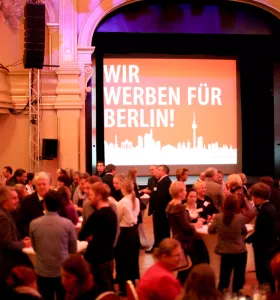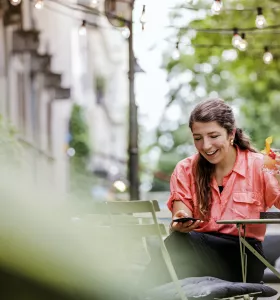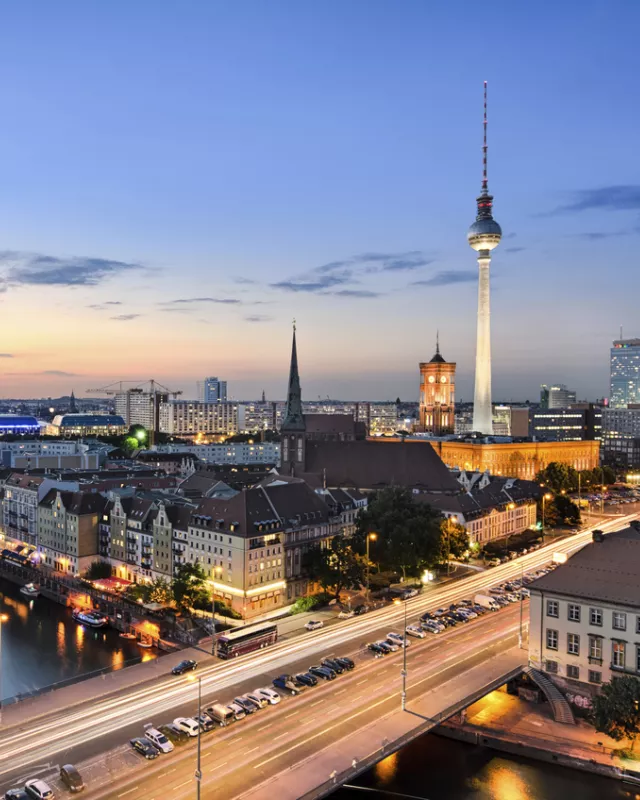Heading towards the future: How Berlin's tourism and event industry is embracing the megatrends of our time
Berlin, January 2023 What does the future look like for us? Do we know how our work will be and how we would live? What does the travel scene look like? What people refer to as megatrends today are shaping the world of tomorrow. Futurologist Anja Kirig called these long-term, fundamental developments "avalanches in slow motion" in her presentation for the TourismusHub, visitBerlin's e-learning tool. She presented some megatrends that seem to be playing a key role in tourism - and as such, also for Berlin itself given that it is one of the world's top tourism destinations.
What sets megatrends apart from hypes and fads?
In contrast to more short-term developments, megatrends have an impact over much longer periods of time. The renowned Zukunftsinstitut, where Anja Kirig works closely, evaluates these trends to span at least a few decades. Megatrends are indeed global phenomena and exert an influence on all areas of life, for example society and its value system, politics, media and consumer behaviour. In addition, they are typically highly complex and interconnected, which can further amplify their impact.
The twelve megatrends of this day and age
The Zukunftsinstitut has discerned twelve Megatrends that are shaping the way our lives and our world are evolving. They include socio-demographic phenomena such as the so-called gender shift, like the steadily fading relevance of traditional gender roles. People are already well aware of the concept of globalisation, for example. This megatrend is associated with a growing interconnectedness that spans across the globe and the ever more intensive interactions on a personal as well as on an economic, political and cultural level.
Megatrends and tourism
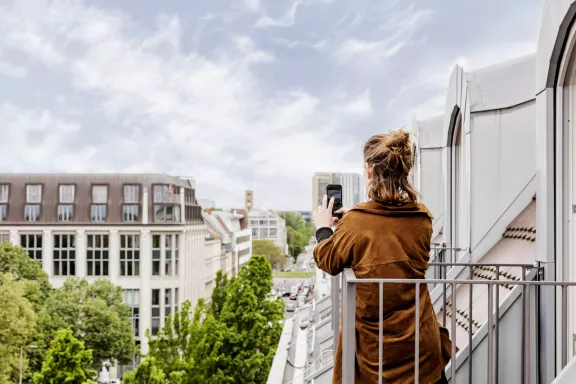
Individualism
Which megatrends are especially germane to tourism? Anja Kirig talks about individualisation, for one thing. It means that people are enjoying greater freedom in all areas of their lives than ever before. Exaggerated, however, this can lead to them becoming alienated from each other, which in turn creates a new longing for connection. When applied to travel behaviour, this gives rise to the notion of resonance tourism. Travellers want to relate to their destinations and let them have an impact on them. Formative experiences hold more appeal than short-term experiences. Meeting people and knowing the stories behind all the sights gets more traction than just visiting sites and taking selfies.
Neo-ecology
This term stands for a fundamentally changed view of the global ecosystem. Humans are no longer perceived as consuming, and in some cases even endangering, but rather as part of the Earth's ecosystem. New technologies are no longer threats to the environment, but are designed as solutions to its problems. Moreover, ecological responsibility is no longer associated with renunciation, but with environmentally friendly alternatives. When translated into tourism, neo-ecology means that travellers as well as hosts are aware of their responsibility and that environmentally friendly alternatives are put in the forefront instead of restrictions and prohibitions.
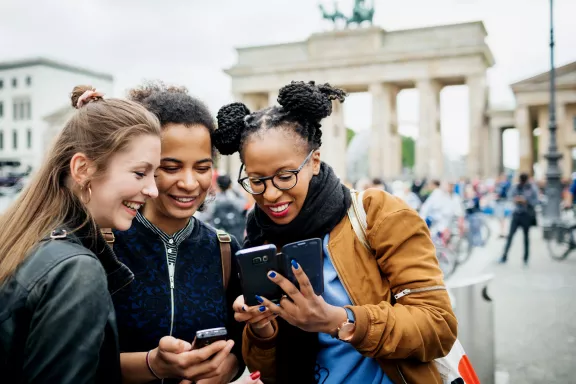
Connectivity
Connectivity describes the networking, partly the merging of the physical and virtual world. Digitalisation paves the way for completely new possibilities. What this means for travellers, for instance, is that they can experience their destinations in new dimensions with value-tainment formats and virtual reality and enter into resonance and interactions with people and objects alike. On the other hand, hosts can also learn more about their guests and get to know their preferences more easily than ever before. And connectivity also provides new ways for citizens to participate in decisions about their city and its development as a destination.
How the tourism industry and visitBerlin are harnessing the megatrends
The visitor economy and Berlin's event industry, as well as visitBerlin, are not just mere spectators of the key issues of our time. Numerous offers and projects are in tune with megatrends and are putting them into practice in the form of new measures and opportunities.
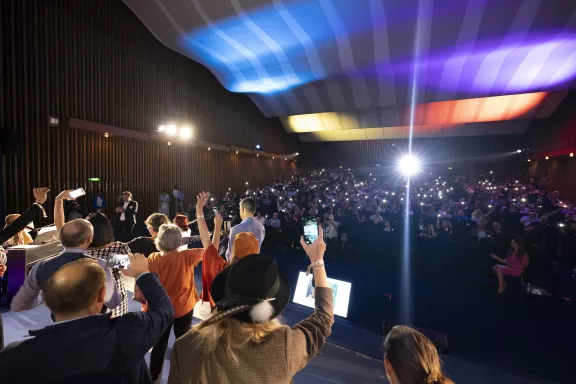
Individualisation for tourism and business travel
Thanks to two apps, visitors can delve into the city and design their very own individual experience routes through the city. "About Berlin" offers stories and background information on more than 250 historical sites with a wealth of multimedia elements. The app "Going Local Berlin" takes travellers to places away from the well-known tourist hotspots and in doing so presents the city through the eyes of the Berliners themselves. The megatrend of connectivity is also being explored here from a digital perspective.
Individualisation opens up new perspectives for organisers and the MICE industry. In the summer of 2022, more than 900 participants congregated at the Bestival for the second time. At this industry meeting, Berlin's potential as a location for events, congresses and conferences was not only discussed theoretically, but the possibilities were turned into a tangible experience at various locations. In this way, the experts came into direct contact with Berlin - and thus with the resonance that travellers and event organisers alike are looking for more than before in this era of individualisation.
Neo-ecology kicks off on arrival
Taking care of ecological concerns could already be done before arriving in Berlin - that's why visitBerlin offers specially designed products for this, such as city trips via BahnHit. The journey is always conducted in an environmentally friendly way when travelling by train. And with the Berlin Welcome Card, travellers get free travel on public transport throughout the city and discounts at over 180 tourist sites.
Berlin has a steadily growing number of Hotels and Restaurants that are geared entirely towards sustainability. Many places in the city put the environment first - ranging from shopping at the second-hand department stores' NochMall to various Urban-Gardening-projects and new agricultural concepts.
visitBerlin encourages the tourism and event industry to act in a consistently ecologically sound manner by launching several initiatives. Sustainable Meetings Berlin aims to provide comprehensive guidance and support for event planning. Coaching and workshops, clearly defined criteria and a network of specially certified partners help organise events with a focus on sustainability. As of 2023, the tourism component will also be added with Sustainable Tourism. And with the Sustainable Berlin Commitment, players from the MICE and tourism industries will in future pledge to adhere to eleven guiding principles for consistently sustainable action.

Connectivity bridges the gap between travellers, event organisers and citizens
With the tourism data hub, visitBerlin for the first time collects a multitude of tourism-relevant data at one central point. It bundles information from the hotel and restaurant industry, from museums and tourist attractions. At the same time, guests of the city may be provided with up-to-date and particularly target group-oriented information. Measuring visitor flows using mobile phone data opens up new avenues for learning about the behaviour and interests of Berlin's visitors.
The megatrend of connectivity also breathes new life into the MICE industry. With a Berlin Meeting Campus, for example, several venues can be combined and booked as one event location. In this way, participants can experience completely different venues within the framework of a single event and garner more insights into the city than if they were to hold a meeting or party at a single location.
However, the term connectivity does not solely stand for digital networking. It also represents the bond between citizens and their city. For example, since November of last year, 24 Berliners have had the chance to voice their interests in the new "Berlin Tourism Citizens' Advisory Council" and thus have a direct influence on the tourism planning of their city.
Another megatrend: New Work
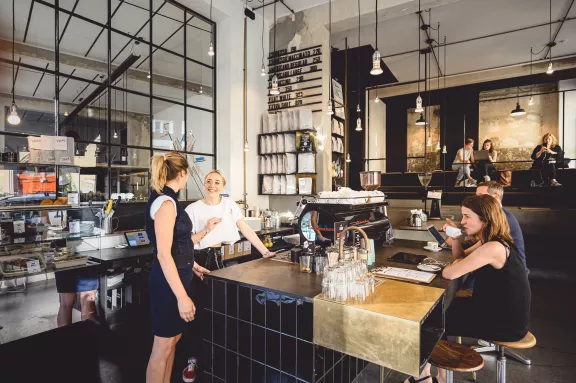
It is not just since the corona pandemic, but most definitely accelerated by it, that new forms of working are gaining ground. No wonder, therefore, that the Zukunftsinstitut has identified New Work as another megatrend. Mobility is an essential factor here. A growing number of activities can be carried out remotely, i.e. theoretically from anywhere in the world where there is an internet connection. This makes models like workation come into play. No one longer has to take leave to travel to holiday destinations. Just take a laptop, work and get to know new countries and people along the way. The city offers a wealth of different Coworking Spaces, some combined with gastronomic offerings or even childcare. Hotels like The Social Hub are designed specifically for "digital nomads" who are not only at home on the road, but also at work on the move.

